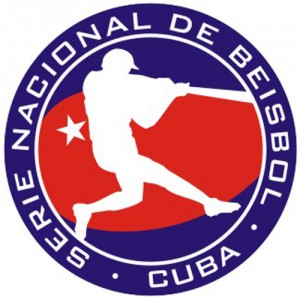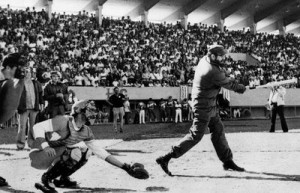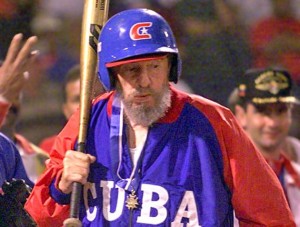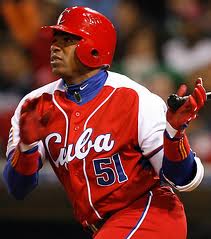A Cuban Take on America’s Favorite Pastime
April 10, 2012 by admin
While wandering through the seemingly endless number of stalls in Havana’s crafts market, I decided to stop at a t-shirt stand. I was still deciding what souvenirs to get for all of my family, and had finally settled on an Industriales baseball team t-shirt for my dad. Although during the trip I had not been able to actually attend a baseball game (probably my only regret from the entire trip), I knew that people in Cuba are almost as crazy for the sport as Americans are. As I attempted to make small talk with the vendor using my pathetic broken Spanish, the conversation shifted to a discussion of where I was from. When I told the man I was from New York, his face instantaneously lit up as he echoed “the United States?” He then proceeded to prattle off a list of MLB baseball players who were all Cuban-born. Jose Contreras, Orlando Hernandez, and Jose Canseco were just a few of the players the man listed. Clearly, these men were a source of great pride for the vendor.
As reported by the New York Times, “Cuba has the longest baseball tradition in the world outside the United States, and probably the most deeply felt one as well.”[i] The sport first arrived on the island in the latter half of the 19th century just before the nation’s first War of Independence. It was spread by a combination of Cuban scholars returning from studying in the United States and American sailors who were anchored in Cuban ports. The game quickly became a hit (pun intended), and over the years has sustained itself as one of Cuba’s most popular pastimes. In 1961, the government created the Insituto Nacional de Deportes, Educacion Fisica, y la Recreacion (National Foundation of Sport, Physical Education, and Recreation, or INDER) in order to oversee all athletics within the nation. It was under INDER that the Serie Nacional de Béisbol, or Cuban National Series, was established.
Today, the Cuban National Series consists of 16 teams, one from each province and two from Havana. Like in the United States, these teams are further divided into two leagues, Liga Oriental (translated as east) and Liga Occidental (translated as west). The National Series runs from November to April. Afterwards, certain players from the National Series are selected to join one of the four teams that make up the Super Series, a different series that runs from May through July. Players are selected from the Super Series to join the National Team.[ii]
Generally speaking, baseball is one of the areas through which Cuba has been able to achieve global recognition. The National Team is currently ranked number one on the International Baseball Federation’s World Rankings list (the United States is second).[iii] Moreover, as was already alluded to through my anecdote about the t-shirt vendor, some Cuban players have enjoyed international fame and success. In February of this year, Havana Times published an article that addressed the popularity of Cuban MLB players. According to the article, “While these players become untouchables for the Cuban media once they have left the island, treated as traitors by the Cuban government, the fans often maintain their interest and wish the players well.”[iv] The text then proceeds to provide a link to a website where vistors can track the stats and information about Cubans who are currently playing the United States. As this article evidences, in spite of all the bad blood that might exist between Cuba and the United States, ball players who have left the country to play in the US are still highly regarded. For the average Cuban citizen, the players’ stories highlight individuals who were not only able to make a name for themselves abroad, but moreover ascend to a level of national recognition and celebrity. These athletes are a source of pride for many fans back in Cuba and help draw attention to just one of the fields in which the nation excels.
Along similar lines, baseball has provided common ground around which the United States and Cuba have been able to establish some sort of a relationship. Only a few weeks ago, USA Baseball and the Cuban Baseball Federation announced that for the first time in 16 years an international friendship series would resume between American college and Cuban baseball teams. This series last occurred in 1996, and ended after the Helms-Burton Act was passed under President Clinton. This July, Collegiate National teams will venture down to Cuba to play a total of five games at Havana’s Latino Stadium. The following summer the series will take place in the United States. Higinio Velez, President of the CBF, commented, “‘These games are of great importance to our federation…It is going to contribute to the development of players in our country, and it will be an opportunity for the athletes and audience to view the development of baseball in Cuba and the United States.’”[v]
While commentators are careful not to imply that any political relationship will arise out of this arrangement, one cannot help but hope that this development will eventually lead to better US-Cuba relations.
Further sources:
I could probably extend this post on forever, so instead I’ll leave you with a few websites and articles that I found particularly interesting:
http://abcnews.go.com/Sports/LegalCenter/story?id=3012635&page=1#.T4SLKyPm_EI
-article detailing 2007 a case where a top sports agent was charged with smuggling Cuban baseball players into Florida
http://www.nytimes.com/2007/04/26/sports/baseball/26cuba.html
-fascinating article from the New York Times about how baseball would change if the embargo were to end (published right around the time Fidel stepped down)
http://www.cubanball.com/index.html
-useful site where you can learn about the history of baseball in Cuba and all the players who have come to play in the United States
[i] Dan Rosenheck, “Cuba’s Pastime: Beating Foreign Competition”, New York Times, March 12, 2009. http://www.nytimes.com/2009/03/13/sports/baseball/13cuba.html
[ii] “Stealing Home: The Case of Contempoarary Cuban Baseball”, PBS. http://www.pbs.org/stealinghome/index.html
[iv] “Tracking Cuba’s Ball Players in MLB”, Havana Times, February 25, 2012. http://www.havanatimes.org/?p=62955
[v] Press Release USA Baseball, “USA Baseball, Cuba to renew Collegiate International Friendship Series”, International Baseball Federation, Wednesday, March 25, 2012. http://www.ibaf.org/en/news/2012/03/21/usa-baseball-cuba-to-renew-collegiate-internationa/63ed2a80-8e11-4dc6-bb79-912848129bcd
Leave a Reply
You must be logged in to post a comment.



